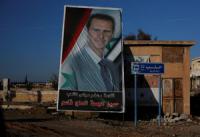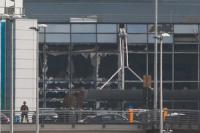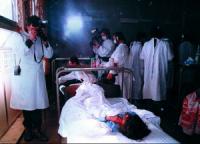-
ISIS in Africa: Implications from Syria and Iraq
Leaving aside the mismatched ethno-linguistic groupings included in the vast territory stretching from Eritrea and Somalia in the east to Mauritania in the west, ISIS’s interest in establishing a presence in that part of Africa has long been a part of its vision for a global caliphate. Battlefield setbacks in ISIS’s strongholds in Iraq and Syria since 2015, however, raise questions of what impact this will have for ISIS’s African aspirations.
-
-
Foreign military bases in Africa
In recent years Africa has become more important to Western security for two reasons: terrorism and migration. The two areas on which the West’s attention is focuses are the Sahel and the Horn of Africa. U.S. drones and French soldiers have helped African armies to fight Islamist militants and push them into the hinterlands.
-
-
Mali should engage separatist, Islamist groups in talks: Bamako peace conference
A peace conference meeting in Bamako, Mali, this past weekend said the Mali government should begin talks with the leaders of Islamist groups which, in 2012, led north Mali to break away from the rest of the country to create the independent Republic of Azawad and which, more recently, have launched deadly attacks on Malian and French soldiers and UN peacekeepers.
-
-
Mali: Spate of killings by armed groups
Armed groups have carried out a wave of killings in central Mali since January 2017. The killings, by Islamist armed groups, self-defense militias, and, to a lesser extent, government soldiers, have resulted in at least fifty-two deaths, led to the displacement of over 10,000 people, and dramatically elevated ethnic tensions. The Malian authorities are not doing enough to investigate and prosecute all those responsible.
-
-
Less armed conflict but more political violence in Africa
While Africa accounted for only 16 percent of the global population in 2016, more than a third of global conflict took place here last year. Conflict data sources show fewer armed conflicts, but political violence in Africa is rising and it is more complex than before. But it is significantly less deadly than in previous decades, according to a number of conflict data sources.
-
-
AFRICOM holds annual Resources and Assessments Workshop
U.S. Africa Command held its annual Resources and Assessments Workshop in Heidelberg, Germany to discuss fiscal matters and the way ahead. Topics discussed included the future posture of U.S. forces in Africa, current operations, crisis management, West Africa Logistics Network concept, and construction projects.
-
-
U.S.-Morocco enduring friendship highlighted at Flintlock 2017
This year marked the tenth iteration of Exercise Flintlock, which focuses on building partner capacity and enhancing interoperability among twenty-four African and Western partners training in seven partner nations. The threat posed by violent extremist organizations around the world demands proficiency, coordination and enhanced interoperability in order to counter it. While regional security was the main focus of Exercise Flintlock 2017, “the lessons learned and investments in relationships will allow us to share the burdens of managing conflicts and improve our ability to provide security solutions that meet threats at their origin,” AFRICOM said.
-
-
Time to rethink the peace operations partnership in Africa
About 75 percent of all personnel in multilateral peace operations are now deployed on the African continent. Currently, the global partnership with African actors on peace operations is not sufficiently equitable and balanced. The underlying assumptions of the relationship between African and external actors need to be reconsidered, according to a new report, if peace operations are going to counteract current and future challenges to security (for example, terrorism, criminality and insurgency) and respond to the needs of local citizens and communities.
-
-
When ideas of peace meet politics of conflict
Burundi has experienced cycles of violence, civil war, and even genocide since achieving independence from Belgium in 1962. So, when this small central African country finally held democratic multiparty elections in 2005 following a lengthy peace process, the international community cheered. Here, perhaps, was a nation set to become a model for post-conflict inclusive governance. A model for building peace. Research by an expert in peacebuilding shows, however, how international ideas, practices, and language of conflict resolution are transformed when they meet African “realities and politics on the ground.”
-
-
The Bible as a weapon of war
Joseph Kony, the genocidal leader of the murderous Lord’s Resistance Army (LRA), claimed to have been sent by God to liberate the people of Northern Uganda. From the start of their insurgency in 1987, Kony’s LRA claimed as their major objective the establishment of a government based on the Ten Commandments. How do former Lord’s Resistance Army soldiers – men, women, and children who have used the Bible as a weapon of war – learn to reread the scriptures once they return home? This is the puzzle facing researchers from Uganda and Cambridge.
-
-
By insisting Assad must go, the West has prolonged the Syrian conflict

The most enthusiastic Western advocates of removing Assad form a liberal tendency and have been arguing for some form of intervention in Syria ever since the war began in earnest. They are opposed by more realist voices, who exhort them to remember the lessons of Iraq before getting militarily involved. Those on this side point to Syria’s fractured and often radical opposition, the regime’s formidable and battle-hardened forces, and the risks of starting a proxy conflict between the world’s great powers. In combination, these two tendencies have landed United States and United Kingdom foreign policy in an awkward gap between ends and means: Assad must go, but the military means required to remove him are off limits. It feels good to demand that a brutal dictator should no longer be allowed to rule, but insisting on it while failing to back it up with action has helped to prolong unimaginable suffering. Assad is clearly despicable, but the only atrocities worse than those his government has already committed are those yet to come. There are two ways to avert them: either Assad is deposed, probably via U.S.-led military intervention, or some political accord is struck to allow him to stay in exchange for a permanent ceasefire.
-
-
Islamist suspect arrested over Borussia Dortmund football club bus bombing

An Islamist suspect has been arrested by the German police, and a second one is being sought, over three explosions which yesterday rocked the team bus of Borussia Dortmund football club. The bus was hit while on its way to the Signal Iduna Park stadium for a European Championship League quarter-final game against the Monaco football club. The game is being played today, under heavy security.
-
-
Why do some with radical views become terrorists – but others do not?

Since most people who hold radical views do not become terrorists, what are the factors that drive some to violent extremism? Is there a connection between mental illness and terrorist involvement? And why do some interrogators resort to torture when the body of evidence shows building rapport with suspects is more effective? These questions and others are addressed in a special issue of American Psychologist, the flagship journal of the American Psychological Association.
-
-
New training course on understanding, preventing radicalization, violent extremism
Practitioners and civic actors including law enforcement officers, school officials and community leaders can now, through a new self-paced, online training, gain a better understanding of radicalization to violence and violent extremism in the United States. Made available at no cost to learners, thanks to funding from the DHS, the course will also introduce a broad spectrum of community-led activities intended to foster resilience and counter violent extremism.
-
-
The Assad regime’s chemical-weapons kill chain

“There’s a long list of Syrian officials with blood on their hands — but the culpability goes all the way to the top,” Gregory Koblentz writes in one of the more important analyses of the Assad regime’s strategic use of chemical weapons (“Syria’s Chemical Weapons Kill Chain,” Foreign Policy, 7 April 2017). Koblentz, the author of Living Weapons: Biological Warfare and International Security, explains that the Syrian chain of command for chemical weapons is composed of four tiers: the senior leadership, which authorizes the use of these weapons and provides strategic guidance; the chemists, who produce, transport, and prepare the chemical weapons for use; the coordinators, who provide intelligence on targets and integrate chemical weapons with conventional military operations; and the triggermen, who deliver the weapons to their targets. “Together, these individuals and organizations form a chemical-weapons kill chain,” Koblentz writes.
-
More headlines
The long view
Factories First: Winning the Drone War Before It Starts
Wars are won by factories before they are won on the battlefield,Martin C. Feldmann writes, noting that the United States lacks the manufacturing depth for the coming drone age. Rectifying this situation “will take far more than procurement tweaks,” Feldmann writes. “It demands a national-level, wartime-scale industrial mobilization.”
No Nation Is an Island: The Dangers of Modern U.S. Isolationism
The resurgence of isolationist sentiment in American politics is understandable but misguided. While the desire to refocus on domestic renewal is justified, retreating from the world will not bring the security, prosperity, or sovereignty that its proponents promise. On the contrary, it invites instability, diminishes U.S. influence, and erodes the democratic order the U.S. helped forge.
Fragmented by Design: USAID’s Dismantling and the Future of American Foreign Aid
The Trump administration launched an aggressive restructuring of U.S. foreign aid, effectively dismantling the United States Agency for International Development (USAID). The humanitarian and geopolitical fallout of the demise of USAID includes shuttered clinics, destroyed food aid, and China’s growing influence in the global south. This new era of American soft power will determine how, and whether, the U.S. continues to lead in global development.
Water Wars: A Historic Agreement Between Mexico and US Is Ramping Up Border Tension
As climate change drives rising temperatures and changes in rainfall, Mexico and the US are in the middle of a conflict over water, putting an additional strain on their relationship. Partly due to constant droughts, Mexico has struggled to maintain its water deliveries for much of the last 25 years, deliveries to which it is obligated by a 1944 water-sharing agreement between the two countries.
How Disastrous Was the Trump-Putin Meeting?
In Alaska, Trump got played by Putin. Therefore, Steven Pifer writes, the European leaders and Zelensky have to “diplomatically offer suggestions to walk Trump back from a position that he does not appear to understand would be bad for Ukraine, bad for Europe, and bad for American interests. And they have to do so without setting off an explosion that could disrupt U.S.-Ukrainian and U.S.-European relations—all to the delight of Putin and the Kremlin.”
How Male Grievance Fuels Radicalization and Extremist Violence
Social extremism is evolving in reach and form. While traditional racial supremacy ideologies remain, contemporary movements are now often fueled by something more personal and emotionally resonant: male grievance.
